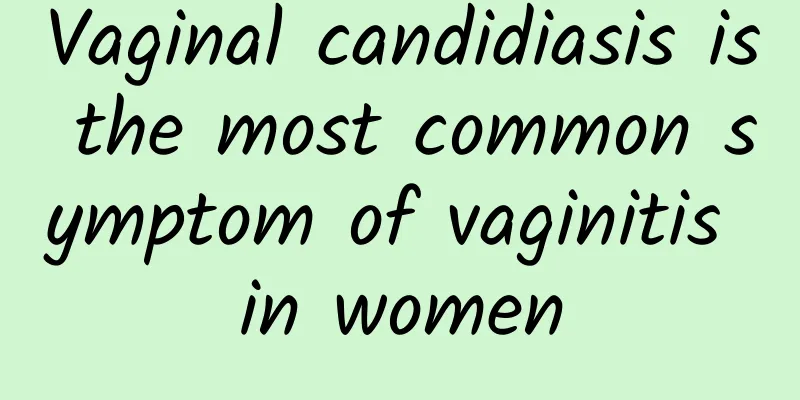How long does it take before you can go out after a painless abortion? What are the precautions after an abortion?

|
In life, many women accidentally get pregnant, but they are not mentally prepared, so they choose to terminate the pregnancy. Nowadays, the most common way to terminate pregnancy is abortion, and painless abortion is one of them. Women who have aborted need to pay attention to rest and recuperation in order to recover quickly. So, how long after a painless abortion can you go out? You should take a proper rest after the operation. It is best to stay in bed for the first three days because the endometrium is scarred after the abortion. If you move too early, it may prolong the vaginal bleeding time. Nutrition should be increased appropriately because the operation will cause a small amount of bleeding and cause certain damage to the body, so some foods rich in protein and vitamins should be supplemented in time, such as lean meat, fresh fish, eggs, milk or soy products, etc. The body's resistance decreases after abortion, so personal hygiene should be paid more attention. What are the precautions after abortion? 1. Pay attention to rest and strengthen nutrition. After the abortion, you should rest in bed for 2-3 days, and then you can get out of bed and move around, gradually increasing the activity time. Do not engage in heavy physical labor or cold water labor within half a month after the abortion to avoid catching cold. Pay attention to increasing nutrition. Eat more fish, meat, eggs, bean products, etc. Protein-rich foods and fresh vegetables rich in vitamins promote the repair of the endometrium. 2. Keep the vulva clean and strictly prohibit sexual intercourse. The cervix has not completely closed after the abortion. The endometrium also has a repair process. During this period, special attention should be paid to keeping the vulva clean and hygienic. The sanitary napkins and underwear used should be washed and changed frequently. Do not sit in a bath within half a month after the operation to prevent dirty water from entering the vagina and causing infection. If you have sexual intercourse too early after the abortion, it is easy to cause acute endometritis and pelvic inflammatory disease, and may also cause secondary infertility. Therefore, sexual intercourse is strictly prohibited within one month after the abortion. 3. Observe the bleeding. If vaginal bleeding lasts for more than one week after abortion, or is accompanied by lower abdominal pain, fever, turbid leucorrhea with a foul odor, etc., you should go to the hospital for follow-up in time. 4. Adhere to contraception. The best time for abortion is the first three months of pregnancy. After abortion, the ovarian and uterine functions gradually recover, and the ovaries ovulate on schedule. If you do not adhere to contraception, you will get pregnant again soon. Therefore, you should choose reliable contraceptive measures as soon as possible after abortion, and you must adhere to contraception as the main measure. Abortion surgery cannot be used as a contraceptive measure. Although abortion is not a major operation, it will always cause some harm to a woman's body. Therefore, you must take good care of your body after abortion to ensure your health. |
<<: What are the ways to relieve dysmenorrhea? 4 ways to quickly relieve dysmenorrhea in 5 minutes
>>: What is Trichomonas vaginitis? How is Trichomonas vaginitis caused?
Recommend
How are uterine fibroids caused? Can sexual disorders cause uterine fibroids?
In life, many female friends have uterine fibroid...
What causes dysmenorrhea in girls?
Some girls often suffer from dysmenorrhea in thei...
What are the dangers of cervical warts?
There are many sexually transmitted diseases in t...
Patients should pay attention to daily precautions for pelvic inflammatory disease
Pelvic inflammatory disease is very common in lif...
How to recover after endometrial thickening surgery
Normal endometrium changes periodically with the ...
How to take good care of ectopic pregnancy in life
It is very common for pregnant women to have ecto...
Symptoms and characteristics of ovarian cysts in adolescent girls
The ovaries are an important part of the female r...
Common treatments for uterine fibroids
Uterine fibroids mainly refer to tumors that occu...
Treatment of pelvic effusion
Pelvic effusion can be divided into physiological...
Which women are prone to candidal vaginitis?
Which women are more likely to suffer from vagini...
Will uterine cavity separation disappear gradually in early pregnancy?
The occurrence of uterine separation in early pre...
Bariatric surgery for obesity and diabetes helps control blood sugar
There are as many as 1.5 million diabetes patient...
Diagnosis of Pituitary Amenorrhea
Organic lesions or functional disorders of the pi...
The dangers of ovarian cyst rupture
Risks of ovarian cyst rupture: Speaking of ovaria...
What can I eat after surgery for adenomyoma? What should I pay attention to after surgery for adenomyoma?
What can I eat after surgery for adenomyoma? What...









